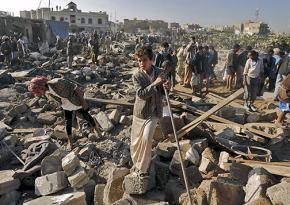America’s favored dictatorship
Belfast Telegraph columnist examines the crimes of Saudi Arabia.
IN GENEVA, Switzerland, earlier this month, a range of human rights organizations co-sponsored a side event during the 30th session of the United Nations Human Rights Council (UNHRC) addressing "the extensive use of torture and other forms of cruel and degrading treatment in the Saudi criminal justice system."
The discussion also focused on human rights abuses arising from the six-month Saudi-led bombing campaign in Yemen. Missiles fired from waves of jets have reduced Yemeni towns and swathes of the countryside to ruins, killing thousands of civilians and creating what the UN now describes as "one of the world's worst humanitarian disasters."
The "international community" is unlikely to pay much attention to what happens in Geneva. [It paid so little attention that the scandalous appointment of Saudi Arabia to head a UNHRC panel in charge of interviewing and nominating experts to take up human rights initiatives was barely noticed--editor's note.] The refugee crisis has brought other wars, particularly the war in Syria, closer to home.

Moreover, Saudi Arabia is a key ally of the Western powers, whose leaders have no wish to amplify the screams from Saudi torture chambers or from the Yemeni victims of its missile attacks.
Around 80 percent of Yemen's 25 million people are now said by the UN to be "on the brink of famine." At least 3 million have become "displaced persons." Around 1.8 million children are suffering malnutrition.
The Saudis and their Gulf allies launched the air war last March with an intention to reinstate pro-Saudi President and Western ally Abd Rabbuh Mansur Hadi. He'd been driven out by the Houthis, a Shia group which contested the legitimacy of his election.
In the New York Times earlier in the month, Kareem Fahim reported: "Errant coalition strikes have ripped through markets, apartment buildings and refugee camps. Other bombs have fallen so far from any military target...that human rights groups say such air strikes amount to war crimes." In one ruined factory "photographs...showed shredded bodies, some incinerated beyond recognition."
The kid-glove treatment of Saudi Arabia by the West, even as it uses an iron fist to crush innocent lives and human rights, is not new. In the past year, the Saudis have carried out more beheadings than the Islamic State in Iraq and Syria (ISIS). One was of a woman who had allegedly helped another flee a violent husband. In January, journalist and blogger Raif Badawi was sentenced to 10 years in prison and a thousand lashes for "insulting Islam" and "apostasy."
Saudi Arabia is the main source of the Wahabist ideology shared with groups like al-Qaeda and ISIS. There is no freedom of religion in the country, just as it's illegal to try to form a political party, trade union or community group, or to publish an independent newspaper. The U.S.-based NGO Freedom House ranks Saudi Arabia in a tie for last in the world with North Korea regarding democratic rights.
SAUDI WOMEN are forbidden from driving or from occupying any public role. Yet the head of the International Monetary Fund, Christian Lagarde, described the late King Abdullah as "a strong believer" in women's rights.
This preposterous remark at Abdullah's funeral eight months ago was by no means the occasion's most absurd statement. That accolade belongs to Secretary of State John Kerry: "The U.S. has lost a friend. The world has lost a revered leader." David Cameron spoke of the late king's "commitment to peace and to strengthening understanding between faiths."
The late monarch's commitment to peace and understanding was put to the test in February 2011, when more than 200,000 Bahrainis, inspired by the wider Arab Spring, occupied the Pearl Roundabout in the capital of Manama, demanding democratic reform and an end to corruption.
The demonstrators were both Sunni and Shia and from every part of Bahraini civil society. The Saudis weren't going to stand for that sort of thing.
In March, the tanks rolled across the border. About 40 people were killed as the protest site was cleared. Scores of doctors, teachers and lawyers, alleged leaders of the movement, were jailed. Many "ordinary" demonstrators were abducted and tortured. The democracy movement was crushed.
There was no international outcry, no resolution at the UN Security Council, no push for sanctions. Bahraini citizens yearning for democracy counted for next to nothing compared to an oil-rich sectarian dictatorship which had been exporting terrorism for years.
On September 5, Abdullah's successor King Salman met with Barack Obama in the White House. Salman wanted reassurance that the Iran nuclear deal didn't indicate a U.S. tilt away from Saudi Arabia. Kerry provided the reassurance: "We are determined that our Gulf friends will have the political and military support that they need."
The New York Times reported that the Pentagon was finalizing a $1 billion agreement to supply the Saudis with weapons for use against ISIS and "the Houthi rebel movement in Yemen...The deal primarily comprised missiles for U.S.-made F-15 fighter jets, officials said."
Yemenis are very likely soon to begin to flee in very large numbers. This is how refugee crises are made.
First published at the Belfast Telegraph.


